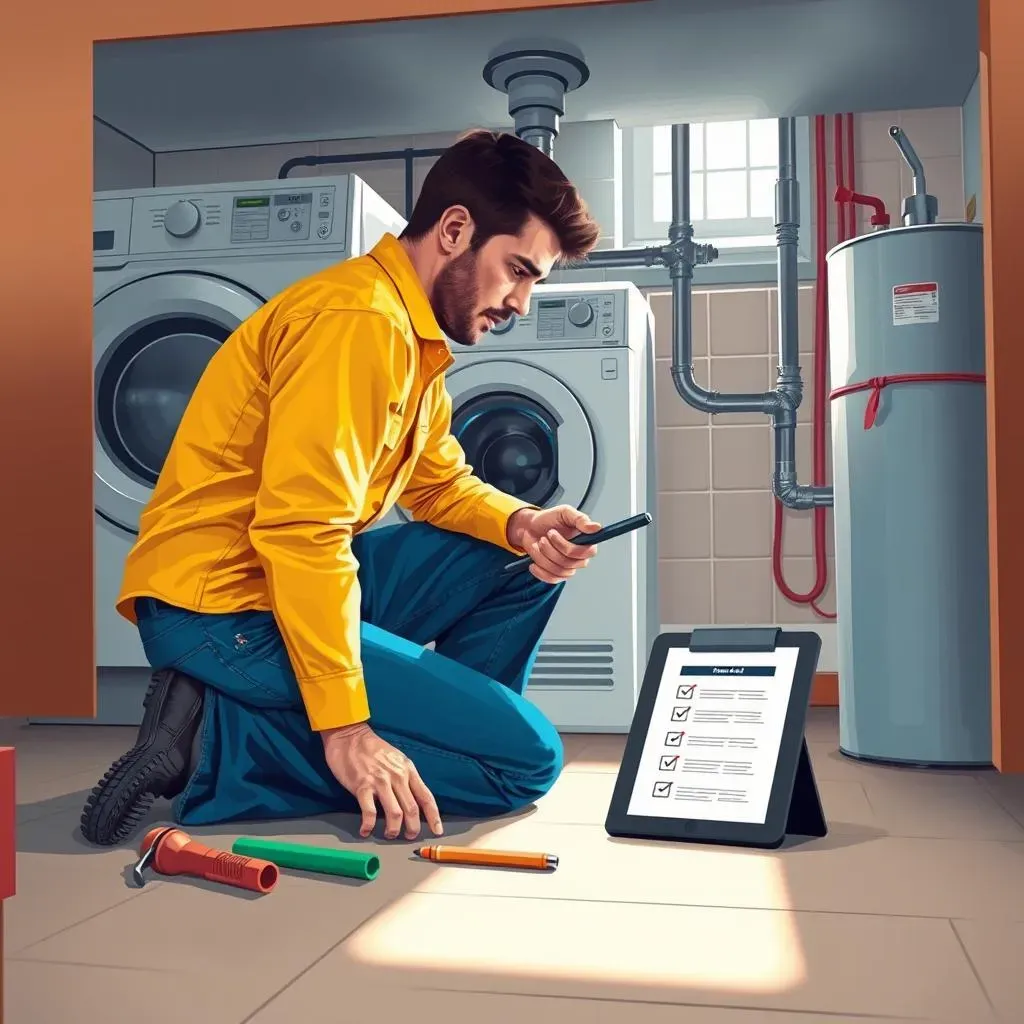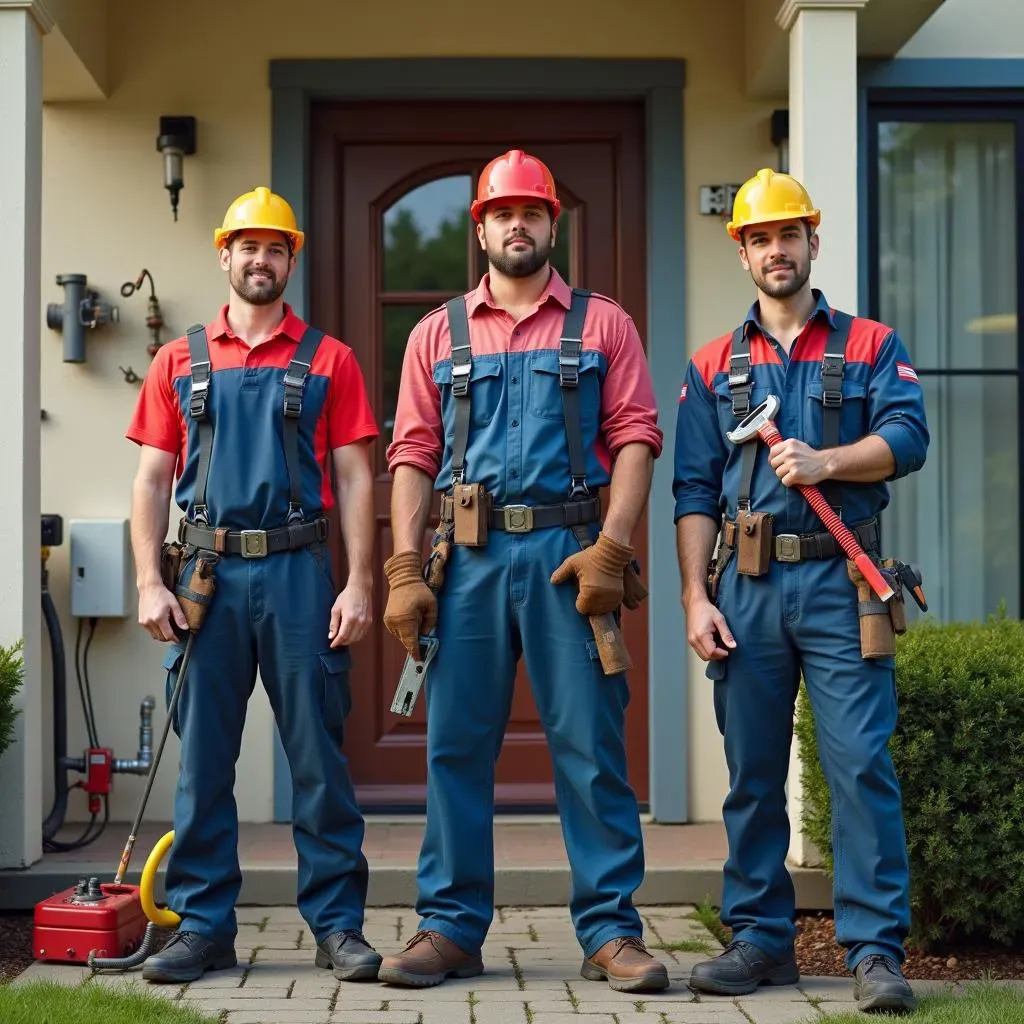Table of Contents
So, you've finally bought your dream home—congratulations! But with the excitement of new walls and fresh paint comes the responsibility of home maintenance. Don't worry, it doesn't have to be a daunting task. This comprehensive guide on home maintenance for new homeowners is your roadmap to a happy, healthy, and well-maintained home. We'll break down essential tasks into manageable monthly and seasonal checklists, making upkeep simple and straightforward. Think of it as a friendly tutorial, not a terrifying chore list. We'll cover everything from the routine – changing filters, checking smoke detectors – to tackling seasonal challenges like winterizing your pipes or prepping your garden for spring. We'll even help you identify when it's time to call in the professionals, saving you money and headaches in the long run. Get ready to transform from a nervous newbie homeowner to a confident home maintenance master! Let's dive in and explore the essentials of keeping your house in tip-top shape.
Essential Home Maintenance Tasks: A Monthly Checklist
Essential Home Maintenance Tasks: A Monthly Checklist
Inspecting Your Plumbing System
Let's start with the basics: your plumbing. Think of your pipes like the arteries of your house; they need regular check-ups to stay healthy. Every month, take a quick stroll around your home, checking under sinks for any leaks or drips. Pay attention to the toilet – is it running when it shouldn't be? A running toilet can waste gallons of water, costing you money and potentially causing damage. A little preventative maintenance now can save you from a major plumbing disaster later. Remember, a little drip can become a big problem! Don't forget to check your water heater; you can learn more about what constitutes proper home maintenance to ensure you're on the right track.
Also, take a look at your washing machine hoses. Are they cracked or worn? These are relatively inexpensive to replace, but a burst hose can lead to a flooded laundry room and a hefty repair bill. It's much better to replace them proactively than to deal with the consequences of a failure. Think of it as replacing worn-out shoelaces before they break and you trip – preventative measures are always the best approach.
- Check under all sinks for leaks.
- Listen for running toilets.
- Inspect washing machine hoses for cracks.
- Check water heater for leaks and proper operation.
Maintaining Your HVAC System
Next up, your heating, ventilation, and air conditioning (HVAC) system. This is the workhorse of your home’s comfort, so keeping it in good shape is crucial. The simplest thing you can do every month is change the air filter. This is a super easy task, but it dramatically improves your HVAC system's efficiency and extends its lifespan. A clogged filter forces your system to work harder, increasing energy bills and potentially causing damage. It's like giving your car regular oil changes; a small effort goes a long way. You can find more tips on creating a home cleaning and maintenance schedule to help you stay organized.
While you're at it, listen to your system when it's running. Are there any strange noises? Unusual sounds could indicate a problem that needs professional attention. Catching these issues early can prevent costly repairs down the line. Regularly checking your HVAC system is like getting a yearly checkup for yourself – a small investment in your health and wellbeing (in this case, your home's wellbeing).
Task | Frequency | Why It's Important |
|---|---|---|
Change air filter | Monthly | Improves efficiency, extends lifespan |
Listen for unusual noises | Monthly | Early detection of potential problems |
Seasonal Home Maintenance: Spring, Summer, Fall, and Winter
Seasonal Home Maintenance: Spring, Summer, Fall, and Winter
Spring Cleaning and Prep
Spring is the perfect time for a deep clean and a thorough inspection of your home's exterior. Start by cleaning your gutters, ensuring water flows freely away from your foundation. Clogged gutters can lead to water damage, so this is a crucial task. Next, inspect your roof and siding for any damage from winter weather. Look for loose shingles, cracks, or signs of pest infestations. If you spot any problems, it's best to address them promptly. A little maintenance now can save you big problems later. For more in-depth advice on spring home maintenance, check out our guide on ultimate home maintenance tips and checklists.
Don't forget your yard! Spring is the time to fertilize your lawn, plant flowers, and prune shrubs. A well-maintained yard enhances your home's curb appeal and creates a welcoming atmosphere. Plus, a healthy lawn helps prevent soil erosion and protects your foundation. Ready to learn more about keeping your home thriving? Check out our ultimate yearly home maintenance list for more seasonal advice.
- Clean gutters
- Inspect roof and siding
- Fertilize lawn
- Plant flowers and prune shrubs
Summer's Maintenance Focus
Summer brings warmer weather and more opportunities for outdoor activities, but it also presents some unique home maintenance challenges. Regularly check your air conditioning unit to ensure it's running efficiently. Clean or replace filters as needed, and inspect the unit for any leaks or unusual noises. Keeping your AC in top shape will help you beat the summer heat and keep your energy bills in check. It's like keeping your car's engine cool in the summer – essential for smooth sailing.
Another important summer task is to inspect your deck and patio furniture. Check for loose boards, cracks, or signs of rot. If you notice any problems, address them promptly to prevent further damage. Make sure your outdoor furniture is also weather-resistant, or store it in a protected area during inclement weather. Regular maintenance will ensure your outdoor spaces are enjoyable all summer long. To learn more about maintaining your outdoor spaces, you might find our guide on Kura home maintenance helpful.
Task | Frequency | Why It's Important |
|---|---|---|
Inspect AC unit | Monthly | Efficiency, prevent breakdowns |
Check deck and furniture | Monthly | Prevent damage, ensure safety |
Fall's Tasks: Preparing for Winter
As the leaves change color and fall from the trees, it's time to prepare your home for the colder months ahead. One of the most important fall tasks is cleaning your gutters again—leaves and debris can clog gutters, leading to ice dams and water damage during winter. This is a crucial preventative measure to protect your home from winter's harsh conditions. It's like putting on a winter coat before stepping out into the cold—essential for protection!
Another important fall task is to inspect your heating system. Make sure your furnace is functioning properly and that the filters are clean. Schedule a professional inspection if you have any concerns. A well-maintained heating system will keep you warm and cozy all winter long and prevent costly repairs later on. It's similar to getting your car winterized – a small investment that pays off big time. For a more comprehensive approach to fall maintenance, consider reading our ultimate winter home maintenance checklist.
- Clean gutters (again!)
- Inspect and clean heating system
- Check for drafts and seal windows
- Winterize outdoor faucets and pipes
Troubleshooting Common Home Issues and When to Call a Pro
Troubleshooting Common Home Issues and When to Call a Pro
Plumbing Problems: DIY vs. Pro
Let's face it: plumbing issues are the bane of many a homeowner's existence. A dripping faucet might seem minor, but it can waste a surprising amount of water and money over time. Similarly, a slow drain can be annoying, but it could signal a bigger blockage lurking beneath the surface. Simple clogs are often easily tackled with a plunger or drain snake – readily available at most hardware stores. However, recurring clogs, persistent leaks, or low water pressure generally point towards a more serious problem that needs a professional's touch. Don't hesitate to call a plumber for anything beyond a simple fix; you can find local experts using our home maintenance near me finder.
Remember, attempting complex plumbing repairs yourself can sometimes lead to more significant damage, costing you even more in the long run. It's always better to err on the side of caution and call a pro if you're unsure. Think of it like this: would you attempt brain surgery on yourself? Probably not! Plumbing can be equally complex; leave it to the experts. A quick online search can help you find reliable local plumbers. A well-maintained plumbing system is crucial for a comfortable and safe home. For more information on home maintenance, check out our guide on what is considered maintenance on a house.
- Dripping faucets: DIY fix (often)
- Clogged drains: DIY fix (sometimes)
- Low water pressure: Call a plumber
- Persistent leaks: Call a plumber
Electrical Issues: When to Call an Electrician
Electrical problems are never something to take lightly. A flickering light might seem like a minor inconvenience, but it could indicate a loose wire or a more serious electrical fault. Similarly, a tripped breaker might be easily reset, but frequent tripping could signal an overloaded circuit. While replacing a light switch or outlet is a relatively straightforward DIY project for the electrically savvy, more complex issues such as faulty wiring or problems with your electrical panel should always be handled by a qualified electrician. Never attempt to work on your electrical system if you're not comfortable and knowledgeable about electrical safety. Your safety is paramount!
Remember, electricity is dangerous and improper handling can lead to serious injury or even death. If you're unsure about anything electrical, it's always best to err on the side of caution and call in a professional. A little preventative maintenance now can save you from a potentially dangerous situation later. Regularly checking your smoke detectors and carbon monoxide detectors is also crucial; a professional home maintenance service can also handle these tasks for you. If you're unsure about any electrical work, call a qualified electrician immediately.
Issue | DIY? | Call a Pro? |
|---|---|---|
Flickering lights | Maybe (simple fix) | Yes (if unsure) |
Tripped breaker | Maybe (single trip) | Yes (repeated trips) |
Faulty wiring | No | Yes (always) |
HVAC System Troubles: DIY or Pro?
Your HVAC system is responsible for your home's comfort, and problems with this system can quickly become major issues. A furnace that won't start or an air conditioner that's blowing warm air are major inconveniences, and can be costly to fix if left unaddressed. While you can perform regular maintenance like changing air filters (as discussed earlier), more significant issues warrant professional attention. Unusual noises, strange smells, or inconsistent temperatures are all red flags, indicating the need for a qualified HVAC technician. Attempting to fix these problems yourself could void warranties or even cause further damage.
Remember, your HVAC system is a complex piece of machinery, and improper repairs can lead to costly repairs down the road. Regular maintenance, such as annual inspections and professional servicing, can prevent many problems and extend the lifespan of your system. You can find more information on monthly home maintenance services to help you stay on top of things. Don't hesitate to contact a professional for any issues you are not confident in handling yourself. Regular HVAC maintenance is a small investment that pays off handsomely in comfort and savings.
- Change air filters regularly (DIY)
- Unusual noises from the unit (Call a pro)
- Inconsistent heating/cooling (Call a pro)
- Strange smells from the vents (Call a pro)
